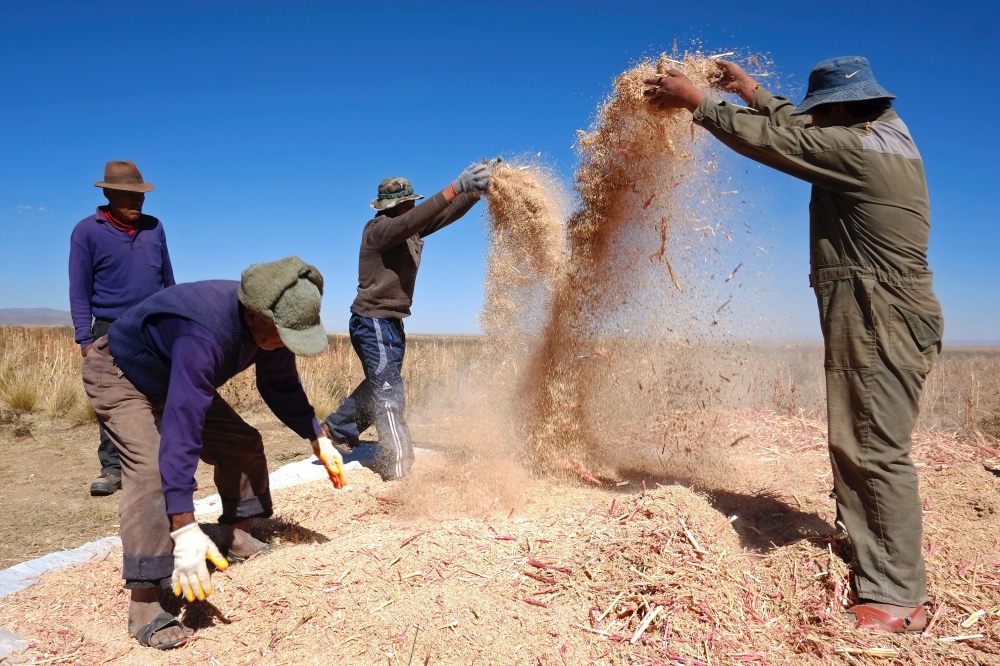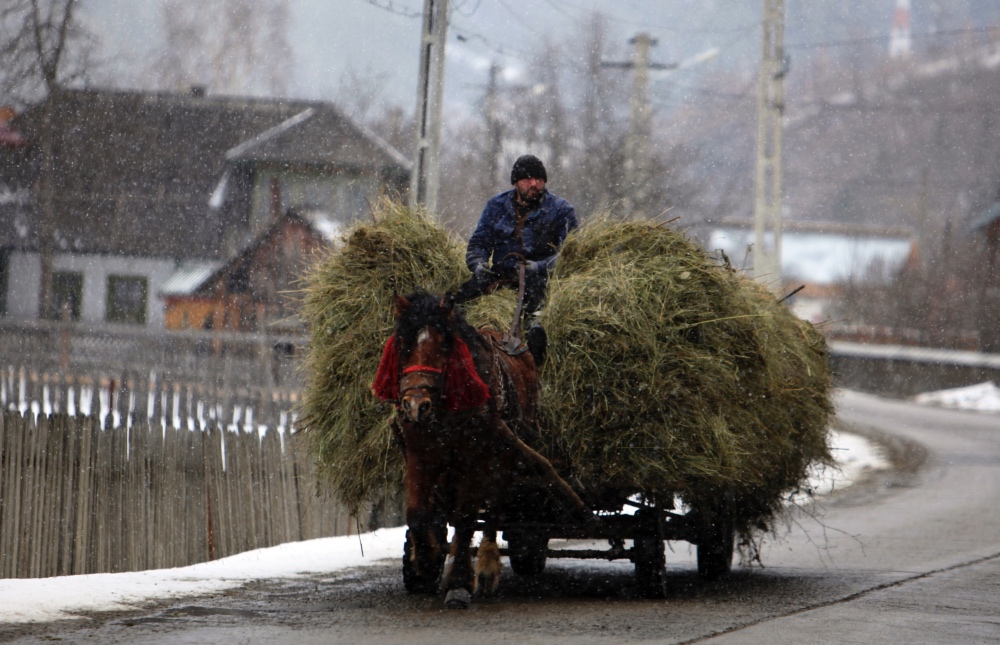
CAREY L BIRON, writing for Thomson Reuters Foundation, reports on hopes the one-year-old UN Declaration on the Rights of Peasants will help rural people defend their rights…
Washington DC, US
Thomson Reuters Foundation
Across the globe, rural workers and rights groups are testing an international agreement they say could help hundreds of millions of people protect their right to own and use land.
In Ukraine this month, land rights advocates sought to use the legal tool, known as the UN Declaration on the Rights of Peasants, to push back on a major planned liberalisation of farmland they say would leave millions vulnerable.
In Colombia, activists say it could be used to nurture the country’s continued transition from half a century of civil war.
And as the European Union discusses its Common Agricultural Policy, some say the agreement could help bend governments’ priorities away from market forces and toward those whose livelihoods are linked to land.

Farmers separate grains during a Quinoa harvest on a field in Tarmaya, some 120 kilometres south of La Paz on 29th April, 2013. PICTURE: Reuters/David Mercado
On Tuesday, rights groups marked the one-year anniversary of the agreement’s adoption at the United Nations, which for the first time recognised the rights of rural groups at the international level and acknowledging them as needing special protections.
“That recognition is very important – it’s the start of everything,” said Ramona Duminicioiu, a Romanian farmer and regional coordinator for La Via Campesina, a movement representing about 200 million farmers and others, and a key backer of the declaration.
“It opens doors…Now we have something to talk about with governments that was achieved at the highest levels in the UN and [that] we want to bring home.”
– Ramona Duminicioiu, a Romanian farmer and regional coordinator for La Via Campesina, a movement representing about 200 million farmers and others.
The declaration seeks to protect rural populations from potential rights violations such as forcible evictions, land degradation and displacement.
It also covers issues like land discrimination and the legal recognition of customary land tenure rights.
The agreement has given traditionally marginalised smallholders, fishing communities and other rural workers a powerful new way to force conversations with officials, Duminicioiu said.
“It opens doors,” she said by phone from her farm in Transylvania, Romania.
“Now we have something to talk about with governments that was achieved at the highest levels in the UN and [that] we want to bring home.”
The declaration, which was adopted in December last year by 121 countries – a majority of UN members – is voluntary and needs to be translated into numerous national laws to be formally implemented.
No country has done that so far, but backers say the agreement is a key step in the emergence of a new idea: a human right to land.
The agreement makes an explicit reference to a “right to land”, making it the first major UN declaration to do so, said Kaitlin Y. Cordes, head of the land and agriculture programme at Columbia University’s Center on Sustainable Investment.
“There has been growing momentum to recognise a human right to land within the international human rights sphere,” she said, describing the declaration’s inclusion as “groundbreaking”.

A man rides his horse-driven cart loaded with hay on a road during a snowstorm near Prundu Bargaului village, 460 kilometres north of Bucharest, on 2nd March, 2013. PICTURE: Reuters/Radu Sigheti
To take the idea further and formally establish such a right universally would create legal obligations for governments as well as new opportunities for justice for those whose land rights have been violated, she said.
While land and property rights exist in all countries to some degree, the agreement’s supporters say a human right to land would supersede those national laws and create new forms of accountability – eventually guiding national legislation, too.
The idea of a human right to land also would require governments and other authorities to shift how they see the purpose of land, moving it away from a purely economic model, said Annette Schramm at the University of Tubingen in Germany.
“To see land as a right means it’s something that local communities use for their own livelihood, and not just…a commodity that needs to be used in the most efficient way,” said Schramm, a peace and conflict expert.
She said the idea gained traction a decade ago amid a global land rush when multinational corporations were buying up or leasing large tracts for agricultural production, often with devastating effects on local populations.
Nearly 50 million hectares of land have been transacted in large-scale deals since that time, according to the Land Matrix database, a project established in 2009 by the International Land Coalition.
Schramm has studied the issue in several countries including Sierra Leone, where she said a 2011 deal saw almost an entire chiefdom converted into a palm oil plantation stretching more than 12,000 hectares.
The acquired land included dozens of villages that were home to 25,000 people – with locals saying they never agreed to the deal, Schramm noted.
The company behind the land purchase, international agro-investor Socfin, said in April that it had gone through “a lengthy process of consultation with the communities, resulting in an overall acceptance and support to the project”.
“To see land as a right means it’s something that local communities use for their own livelihood, and not just…a commodity that needs to be used in the most efficient way.”
– Annette Schramm, a peace and conflict expert at the University of Tubingen in Germany.
The company added that some in the community “decided not to adhere to the project and kept their land”.
Schramm said a human right to land could have helped empower those communities to fight the deal.
The creation of a formal right, she said, “could play a role in that only the investments that are good for locals could go through.”
Establishing a formal human right to land would require the far more stringent process of creating a treaty that would then need to be ratified by each government, explained Cordes of the Center on Sustainable Investment.
But even without being codified in law the declaration is already being used to interpret other existing, enforceable international agreements, said Olivier de Schutter, co-chair of the International Panel of Experts on Sustainable Food Systems.
In a November online video message, he noted that this summer the UN Human Rights Committee had used the declaration to provide an interpretation of the International Covenant on Civil and Political Rights.
This example showed how “human rights bodies could in the future seek inspiration in the declaration to give more weight to peasant rights,” De Schutter said.
That is Elizabeth Mpofu’s goal, too.
Mpofu is a small-scale farmer in Zimbabwe who said she benefited from a land reform programme launched in 2000 that redistributed about eight million hectares from large-scale commercial farms.
But there is more to do to complete the process of agrarian reform, said Mpofu, who chairs the Zimbabwe Smallholder Organic Farmers’ Forum and is general coordinator for La Via Campesina.
She is now working with local groups to see whether the UN declaration can be used to convince the government to provide smallholders with access to finance, help with marketing their crops and other resources.
“Our government supported the declaration,” Mpofu said in emailed comments, “so, it is time for them to walk the (walk) and provide a path forward for rural families”.





